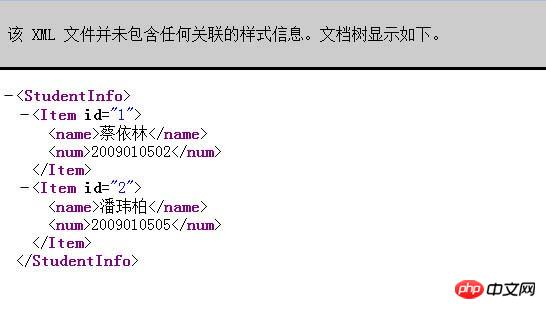 Backend Development
Backend Development
 PHP Tutorial
PHP Tutorial
 Detailed explanation of how PHP uses DOMDocument to operate xml
Detailed explanation of how PHP uses DOMDocument to operate xml
Detailed explanation of how PHP uses DOMDocument to operate xml
This article mainly introduces the method of PHP parsing and generating xml based on DOMDocument. It analyzes various common operating techniques of PHP using DOMDocument to parse xml nodes and generate xml files based on specific examples. Friends who need it can refer to it
The example in this article describes the method of PHP parsing and generating xml based on DOMDocument. Sharing it with you for your reference, the details are as follows:
I have shared with you some knowledge about SimpleXML operating xml, but in PHP there is also DOMDocument in addition to simplexml. This time I will focus on the usage of DOMDocument. Generate xml and parse xml separately
1. xml generation
DOMDocument operation xml is a little more complicated than the previous simplexml, I think simplexml is like dom4j in Java, the principle is the same no matter what. If the nodes and attributes in the DOMDocument are regarded as branches and leaves, then the DOMDocument of the DOMDocument is the root, and the nodes and attributes are all mounted under this object. It will be clear if you look at the following code
<?php
$doc=new DOMDocument('1.0','utf-8');
//创建根节点
$root=$doc->createElement("StudentInfo");
//创建第一个子节点
$item=$doc->createElement("Item");
$name=$doc->createElement("name","蔡依林");
$studentnum=$doc->createElement("num","2009010502");
//创建属性(phpdom可以把任何元素当做子节点)
$id=$doc->createAttribute("id");
$value=$doc->createTextNode('1');
$id->appendChild($value);
//在父节点下面加入子节点
$item->appendChild($name);
$item->appendChild($studentnum);
$item->appendChild($id);
$item2=$doc->createElement("Item");
$name2=$doc->createElement("name","潘玮柏");
$studentnum2=$doc->createElement("num","2009010505");
$id2=$doc->createAttribute("id");
$value2=$doc->createTextNode('2');
$id2->appendChild($value2);
$item2->appendChild($name2);
$item2->appendChild($studentnum2);
$item2->appendChild($id2);
$root->appendChild($item);
$root->appendChild($item2);
//把根节点挂载在DOMDocument对象
$doc->appendChild($root);
header("Content-type: text/xml");
//在页面上输出xml
echo $doc->saveXML();
//将xml保存成文件
$doc->save("stu.xml");
?>This code is actually not complicated if you look carefully. There may be some doubts about the id attribute, and the text node is also It must be mounted under DOMDocument, and then the text node is mounted under the attribute. Let’s take a look at the generated xml

In fact, DOMDocument generates nodes or attributes first, and the hierarchical relationship of xml is finally reflected through addchild
2. DOMDocument parsing
<?php
$doc=new DOMDocument();
//如果是解析xml字符串则使用loadXML
$doc->load('stu.xml');
//取得根节点
$root=$doc->documentElement;
//通过标记的名字取得对应的元素
$items=$root->getElementsByTagName('Item');
foreach($items as $key=>$val){
// echo count($val->attributes);
//id是第一个属性所以使用item(0),nodeValue用来取得节点的值
echo $val->attributes->item(0)->name.":".$val->attributes->item(0)->nodeValue." ";
foreach($val->getElementsByTagName('name') as $key2=>$val2){
echo $val2->nodeValue." ";
}
foreach($val->getElementsByTagName('num') as $key3=>$val4){
echo $val4->nodeValue."</br>";
}
}
?>The focus of parsing is understanding. The getElementsByTagName method, attributes attributes and items are the focus of parsing xml. Everything else is pretty simple. Look at what is parsed

Generally speaking, it is a little more troublesome than simplexml, but as a programmer, it can be accepted.
The above is the detailed content of Detailed explanation of how PHP uses DOMDocument to operate xml. For more information, please follow other related articles on the PHP Chinese website!

Hot AI Tools

Undresser.AI Undress
AI-powered app for creating realistic nude photos

AI Clothes Remover
Online AI tool for removing clothes from photos.

Undress AI Tool
Undress images for free

Clothoff.io
AI clothes remover

AI Hentai Generator
Generate AI Hentai for free.

Hot Article

Hot Tools

Notepad++7.3.1
Easy-to-use and free code editor

SublimeText3 Chinese version
Chinese version, very easy to use

Zend Studio 13.0.1
Powerful PHP integrated development environment

Dreamweaver CS6
Visual web development tools

SublimeText3 Mac version
God-level code editing software (SublimeText3)

Hot Topics
 1377
1377
 52
52
 PHP 8.4 Installation and Upgrade guide for Ubuntu and Debian
Dec 24, 2024 pm 04:42 PM
PHP 8.4 Installation and Upgrade guide for Ubuntu and Debian
Dec 24, 2024 pm 04:42 PM
PHP 8.4 brings several new features, security improvements, and performance improvements with healthy amounts of feature deprecations and removals. This guide explains how to install PHP 8.4 or upgrade to PHP 8.4 on Ubuntu, Debian, or their derivati
 CakePHP Date and Time
Sep 10, 2024 pm 05:27 PM
CakePHP Date and Time
Sep 10, 2024 pm 05:27 PM
To work with date and time in cakephp4, we are going to make use of the available FrozenTime class.
 Discuss CakePHP
Sep 10, 2024 pm 05:28 PM
Discuss CakePHP
Sep 10, 2024 pm 05:28 PM
CakePHP is an open-source framework for PHP. It is intended to make developing, deploying and maintaining applications much easier. CakePHP is based on a MVC-like architecture that is both powerful and easy to grasp. Models, Views, and Controllers gu
 CakePHP File upload
Sep 10, 2024 pm 05:27 PM
CakePHP File upload
Sep 10, 2024 pm 05:27 PM
To work on file upload we are going to use the form helper. Here, is an example for file upload.
 CakePHP Creating Validators
Sep 10, 2024 pm 05:26 PM
CakePHP Creating Validators
Sep 10, 2024 pm 05:26 PM
Validator can be created by adding the following two lines in the controller.
 How To Set Up Visual Studio Code (VS Code) for PHP Development
Dec 20, 2024 am 11:31 AM
How To Set Up Visual Studio Code (VS Code) for PHP Development
Dec 20, 2024 am 11:31 AM
Visual Studio Code, also known as VS Code, is a free source code editor — or integrated development environment (IDE) — available for all major operating systems. With a large collection of extensions for many programming languages, VS Code can be c
 CakePHP Quick Guide
Sep 10, 2024 pm 05:27 PM
CakePHP Quick Guide
Sep 10, 2024 pm 05:27 PM
CakePHP is an open source MVC framework. It makes developing, deploying and maintaining applications much easier. CakePHP has a number of libraries to reduce the overload of most common tasks.
 How do you parse and process HTML/XML in PHP?
Feb 07, 2025 am 11:57 AM
How do you parse and process HTML/XML in PHP?
Feb 07, 2025 am 11:57 AM
This tutorial demonstrates how to efficiently process XML documents using PHP. XML (eXtensible Markup Language) is a versatile text-based markup language designed for both human readability and machine parsing. It's commonly used for data storage an



